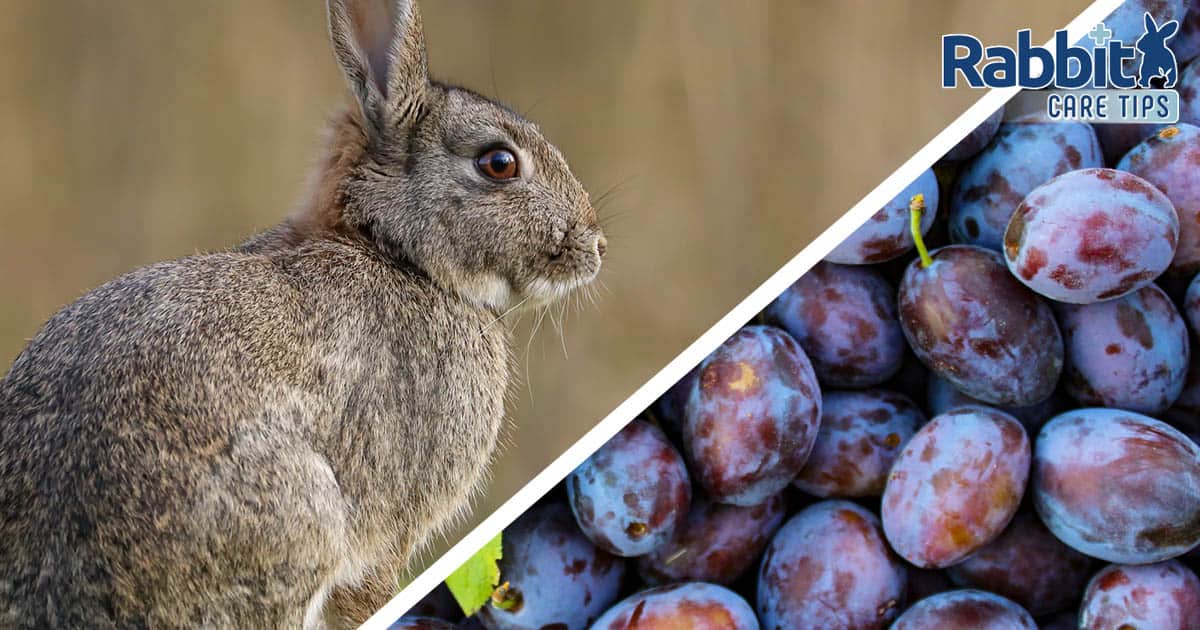Plums are very popular fruits with people, and if you’ve just bought some fresh, juicy plums from the store, you might be wondering whether you can safely share this delicious snack with your bunny.
Plums are reasonably safe for rabbits as long as the stones are removed and the fruit is fed in moderation, alongside fresh water and plenty of hay. Do not give your rabbit large quantities of plums or offer it plum stones as chew toys.
What Health Benefits Do Plums Offer?
Plums are a reasonably healthy option, although they do contain a lot of sugar, so they must be fed in small amounts. A plum is a source of vitamin C, vitamin A, and vitamin K, and it will also contain manganese, copper, and potassium, which will all benefit your rabbit’s body.
Furthermore, plums contain some fiber, which is very important for rabbits. This is particularly present in the skins of plums, so avoid peeling the plum before you give it to your rabbit. The skins are perfectly safe and will provide additional nutrients.
Overall, plums offer a few different benefits, but you must provide them in moderation to keep your rabbit healthy.
How Much Plum Can My Rabbit Have?
Your rabbit should not have more than a couple of teaspoons of fruit a couple of times a week, even if it is a large bunny. Smaller rabbits should have slightly less, and rabbits that have weight problems should not have fruit until they have reached a healthy weight again, as the sugar will worsen these issues.
You need to consider your rabbit’s overall fruit intake, not just how much plum you give to it. If you give your rabbit half a teaspoon of ten different fruits, it would be eating far too much fruit, so you must be careful about this and think about its overall diet, not just individual foods.
Fruit needs to be kept down in quantity because it is generally high in sugar and low in fiber, and this could really upset your rabbit’s digestive system, as well as cause kidney issues and a risk of diabetes. Rabbits have not evolved to handle sugar well, and they will quickly start to suffer if you give them too much fruit.
If you notice that your rabbit has diarrhea, stop feeding it fruit for a while and allow its system to catch up. Feed it less fruit when you start adding this back into its diet, aiming for just a small piece or two once or twice a week.
Why Can’t I Give My Rabbit A Plum Stone?
It is thought that plum stones are unsafe for rabbits because they contain a small quantity of cyanide. This is supposed to deter animals from eating the stone, which protects the seed, and it’s the plant’s way of ensuring that it is able to reproduce properly.
It is unlikely that eating one plum stone would actually result in your rabbit ingesting enough cyanide for it to be dangerous, but you should still be careful. Plum stones might also pose a choking hazard, and although your rabbit could enjoy chewing on them, they might splinter and hurt its mouth.
Avoid giving your rabbit plum stones, even ones that have been washed, as they are likely to smell of food, and the rabbit might try to swallow them. This could cause a blockage, even if the rabbit doesn’t choke. Plum stones should not be on the menu.
How Can I Prepare Plums For My Rabbit?
It’s a good idea to buy organic plums if you can, as even trace amounts of pesticides are not great for your rabbit. Always wash fruit before giving it to the bunny to remove any dirt or debris from the outside, but don’t peel it.
Often, the fruit skin is better for your rabbit than the actual flesh, so unless you know that it is harmful, leaving the skin intact is much better.
Slice off a small section of the plum and then place it in your rabbit’s bowl. It may be a good idea to cut it up so that your rabbit doesn’t get too sticky while eating it, but this will depend on how large your rabbit is and the serving size you are giving it.
How Should I Find Out If My Rabbit Likes Plums?
It is always important to introduce new foods slowly, often with a test run or two, before you trust that the food is safe. You should make sure that you are only giving your bunny a small portion to begin with, and check whether it reacts badly to this.
To find out whether your rabbit likes plums or not, wash a plum and slice off a small amount of the fruit with a sharp knife. Leave the skin on the outside rather than removing it. Put the piece of plum in your rabbit’s pen and wait to see what it does.
If the rabbit eats the fruit, you should then observe its droppings and behavior over the next two days or so. If you see any issues, such as lethargy or loss of appetite, or if the rabbit gets diarrhea or constipation, it may be reacting badly to the plum. Wait for its system to recover before trying again.
If your rabbit has a really bad reaction, don’t give it any more plum, and check in with a vet to make sure it recovers properly. However, if your rabbit seems okay, do another test or two, and then allow it to eat plum a couple of times a week as part of a balanced diet.

